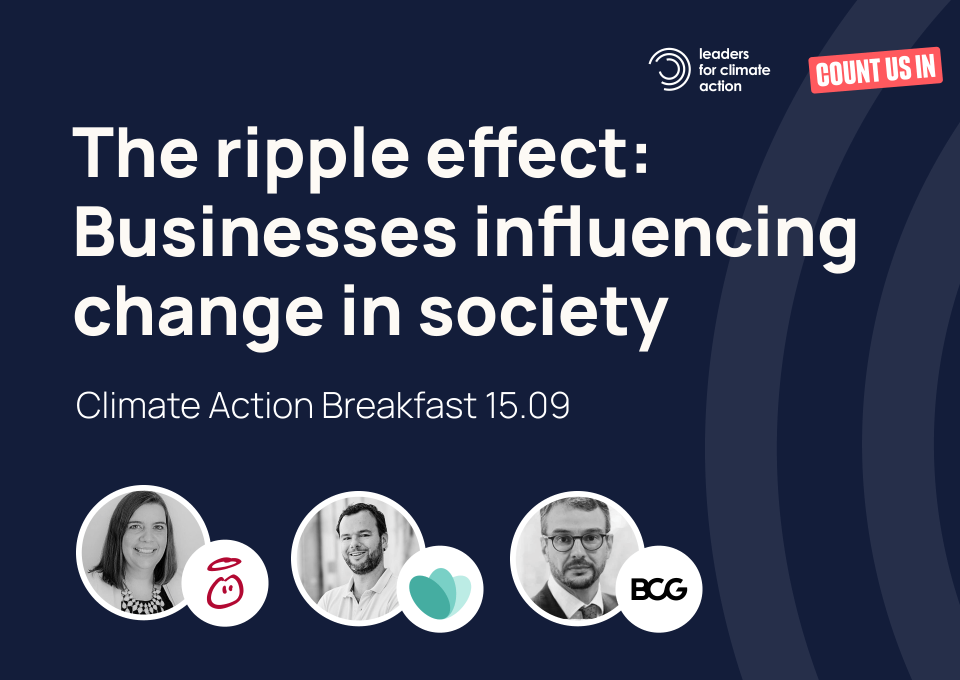Fighting the many different faces of climate change can be quite overwhelming as an individual. However, when companies engage with other members of the public and private sectors, there is a real chance of tackling this great task. But how can they do it?
On the 15th of September 2022, we joined forces with Count Us In for our Climate Action Breakfast to discuss with our community how companies can engage with partners, politics, stakeholders, local NGOs and build alliances with other businesses to have the positive impact our Planet needs. To answer this question, we invited three great speakers from companies that set their minds on fighting climate change through collaboration and sphere of influence engagement.
Connecting companies and fighting challenges as a community | LFCA updates
Already in the earlier months of this year, LFCA started putting the community more and more in the center. We brought this approach forward by helping drive action within industry specific areas and spheres of influence. Even though companies are situated in different industries they still have a lot of problems in common, therefore LFCA wants to step in the role of the facilitator and make it easy for companies to connect with others that struggle with similar problems or challenges and are looking to find a solution.
How can our members do that?
First, our platform is now a Knowledge Hub which makes it easy for companies to create a climate action strategy by looking at the shared experiences and learnings from other members.
Second, you can now find the right climate tools for different actions and services by having a look at the reviews of fellow members in our directory.
Third and most importantly, we launched our monthly Mastermind Groups. These should help you tackle your company’s biggest challenges by connecting with peers from the same industry and sharing ideas, experiences and knowledge. The first batch of groups will start in October and you can sign up using the button below!
Konrad von Szczepanski - Boston Consulting Group: the impact of a High-Impact Sustainability Alliance
Konrad von Szczepanski, Managing Director and Partner at BCG, focused on sustainability alliances. Climate collaboration among private and public actors has been a long term focus of BCG, which led to the writing of the study “How to Build a High-Impact Sustainability Alliance”. Together with their sustainability teams they looked at a number of corporate sustainability alliances trying to understand what makes the ones with impact successful and what can be learned from them. Konrad explained why alliances are formed and what they do: there are certain objectives that individual companies cannot achieve on their own, for example establish sustainable standards within their industry, engage with business diplomacy and drive innovative solutions in value chains. Successful alliances are characterized by who they collaborate with, what they do and how they mobilize: here below you can find these three main pillars further broken down into ten success factors.

Christophe Diercxsens - Too Good To Go: a Planet with no food waste
Christophe Diercxsens, Global Public Affairs Director at Too Good To Go, stressed the importance of the role of food waste in the climate crisis. Being the fight against food waste at the very core of Too Good To Go’s mission, he shared some quite impressive data on the matter.. Currently, 40%of all the food globally produced goes to waste and with this waste, all the resources that had to be used for production are wasted as well.
If food waste was a country it would be the third most CO2 emitting country after the US and China.
This is why Too Good To Go has set itself on the task of saving food and thus saving world resources and reducing the CO2 emissions. However, Too Good To Go brought this approach one step further, engaging also in political advocacy. They recently addressed the matter of the expiry date on food labels. As the current rules on products expiration date mostly lead to early riddance of products that could still be suitable for consumption, Too Good To Go launched the "Look, Smell, Taste, Don’t Waste” Campaign. The aim of the campaign is to involve policy makers and relevant stakeholders in the introduction of a new label which makes customers empirically check the food’s condition before deciding if it can be eaten or not. Talking about such political actions, Christophe mentioned that in order to change things on a bigger scale it is a priority for Too Good To Go to get policy makers engaged and change the food waste legislation.

Karina O’Gorman - Innocent Drinks: Running rewilding projects with local partners
Karina O’Gorman, European Head of Force for Innocent Drinks, explained their commitment to protect and preserve 2 million hectares of land across Europe by 2025, and the three big dreams they are focused on: healthier people, healthier communities and a healthier planet. Considering their product “nature in a bottle”, Innocent decided to give back to Nature through their new project “The Big Rewild”, which has the aim to restore the original uncultivated state of some natural areas across Europe, helping re-establishing their biodiversity balance. With this project they want to help people understand climate change better and make them feel empowered to take climate action also at the individual level. Karina mentioned the importance of local partnerships in such projects,, that’s why each of their markets looked for a community partner that is specialized in land preservation, land protection or nature based solutions.
What is most important to us, is to inspire everyone to understand climate change a bit more and make them feel like they can take action.
As the previous two speakers, Karina pointed out as well how important it is to connect and engage with policy makers in order to create a movement. The five key learnings Karina listed in the end are worth mentioning here as well: clear long term commitments building on established sustainability efforts, partnering with experts at a local level, being transparent, navigating changing sentiment and understanding and most importantly, being brave!

Individual approaches but one goal It was inspiring to see how many specific approaches can lead to a wider impact on the climate crisis, once we set our mind on collaborating with our stakeholders.It is very apparent that in order to have a chance to fight this climate crisis, we will have to stand together and support each other as best as possible. Not only as individuals but especially as companies. As a climate practitioner, there are lots of different paths you can take to scale the climate ambition of your company and influence society at large. As LFCA, it is our mission to help you connect more easily with peers that can help you in this journey and make exchanging challenges, solutions and experiences possible and easy.
If you would like to join our mission and share your knowledge with others or if you want to learn from peers how you can bring climate action in your company to the next level, you are very welcome to join our community today!

